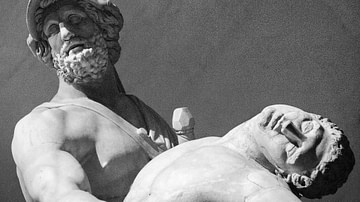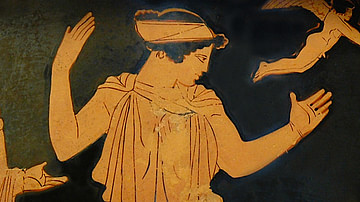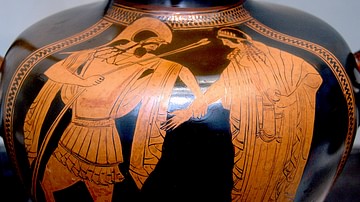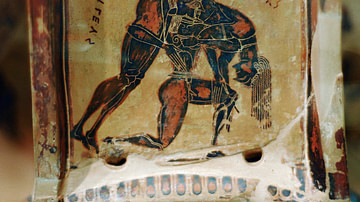Search
Remove Ads
Advertisement
Summary 
Loading AI-generated summary based on World History Encyclopedia articles ...
Search Results

Definition
Menelaus
Menelaus (also Menelaos) is a figure from ancient Greek mythology and literature who was the king of Sparta and the husband of beautiful Helen, whose abduction by the Trojan prince Paris sparked off the legendary Trojan War. The story is...

Definition
Menelaus of Alexandria
Menelaus of Alexandria was a Greek astronomer, scientist, and mathematician who lived around 100 CE. Menelaus made a significant and lasting contribution to the fields of astronomy, geometry, and trigonometry. His major work, the Spherics...

Definition
Helen (Play)
Helen is a Greek tragedy by Euripides (c. 484-407 BCE). It is usually thought to have first been performed at the Great Dionysia of 412 BCE and was part of the trilogy that included Euripides' lost Andromeda. Helen recounts an unusual version...

Definition
Helen of Troy
Helen of Troy (sometimes called Helen of Sparta) is a figure from Greek mythology whose elopement with (or abduction by) the Trojan prince Paris sparked off the Trojan War. Helen was the wife of Menelaus, the king of Sparta, and considered...

Definition
Andromache
Andromache is a Greek tragedy written by Euripides (c. 484-407 BCE), one of only 19 plays (out of 92) to survive. The play is actually in two parts, and like Sophocles' Women of Trachis, it has no central character. The first part of the...

Image
Menelaus & Helen
A detail of an Attic red-figure hydria, c. 480 BCE, showing the Spartan king reunited with his wife Helen of Troy after the Trojan war. (Staatliche Antikensammlungen, Munich)

Image
Menelaus & Patroclus
A statue group possibly representing the Spartan king Menelaus supporting the fallen Patroclus, one of the famous episodes of the Trojan War of Greek mythology. Roman copy of a Hellenistic period original. (Loggia dei Lanzi, Florence)

Image
Menelaus Pursuing Helen
Red-figured hydria attributed to the Syriskos Painter.
Made in Attica, Greece, c. 480 BCE, found in Vulci.

Definition
Iphigenia in Aulis
Iphigenia in Aulis (or at Aulis) was written by Euripides, the youngest and most popular of the trilogy of great Greek tragedians. The play was based on the well-known myth surrounding the sacrifice of Agamemnon and Clytemnestra's daughter...

Definition
Ajax (Play)
Ajax is a play written by the 5th-century BCE Greek poet and dramatist Sophocles. Although Sophocles wrote at least 120 plays, only seven have survived. Of his surviving plays, the best-known is Oedipus Rex (Oedipus the King) - part of a...